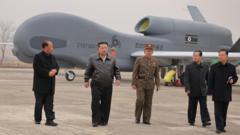North Korea's Kim Jong Un has inspected new AI-equipped suicide drones and plans for increased production. Analysts believe Russian assistance has played a role in these technological developments, heightening security concerns on the Korean Peninsula.
North Korea Escalates Military Capabilities with AI-Powered Drones

North Korea Escalates Military Capabilities with AI-Powered Drones
North Korean leader Kim Jong Un reveals the country's advancements in suicide drones equipped with artificial intelligence, amid reported support from Russia.
North Korean leader Kim Jong Un has been recently photographed inspecting the nation's latest military developments, specifically new suicide drones said to be outfitted with advanced artificial intelligence (AI). The undated visuals were disseminated through the Korean Central News Agency (KCNA), showcasing Kim on a runway alongside military officials as they assessed the drone capabilities. The agency reported that Kim has greenlighted plans to expand the manufacturing of these drones.
Experts suggest that the growth of this technology has been bolstered by support from Russia, with whom North Korea has recently strengthened ties, especially as it aids Moscow in its military operations amid the ongoing conflict in Ukraine. James Patton Rogers, an executive director at the Cornell Brooks Tech Policy Institute and a drone specialist, indicated that the emergence of these drones underscores the deepening relationship between the two nations.
North Korea first disclosed its drone program, which includes "loitering munitions" capable of crashing into targets utilizing their embedded warheads, in August 2024. KCNA reported at that time that the regime was committed to integrating AI technology into its military hardware. Rogers emphasized that the development of such drones represents a significant shift in North Korea's military strategy and could heighten risks for South Korea and the broader international community.
In addition to the drones, Kim revealed what is believed to be the country's inaugural airborne early-warning aircraft. This craft closely resembles commercial passenger planes and employs radar systems to monitor combat zones. However, South Korean officials have cautioned that comprehensive evaluations of the aircraft's capabilities may take more time. Lee Sung-jun, director of public affairs for the Joint Chiefs of Staff, highlighted potential links between the craft's internal systems and Russian technology.
The geopolitical implications of these advancements are profound, as Kim Jong Un faces accusations of supplying weapons to Russia, while it is believed that Vladmir Putin's regime is providing North Korea with space advancements that may bolster its missile development efforts. Cooperation between the two countries was formalized in a June 2022 agreement, wherein both pledged mutual assistance against threats to their nations.
Recently, reports from South Korea's intelligence agency indicated that North Korea has deployed additional troops to Russia and repositioned others to the frontline areas in Kursk, Ukraine, illustrating the ongoing entanglement of military support between the two nations. The situation remains tense, as approximately 1,000 North Koreans have reportedly lost their lives fighting in Ukraine's Kursk region.






















